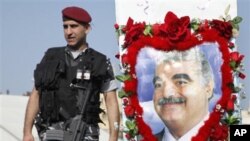On the seventh anniversary of the assassination of former Lebanese Prime Minister Rafik Hariri, many questions remain unanswered and many wounds still remain fresh.
The crime scene was an inferno of blazing wreckage, and the explosion which killed former Lebanese Prime Minister Rafik Hariri caused glass to shatter and masonry to crumble more than a kilometer away. It shook Beirut physically, emotionally, politically and economically.
Immediately after the blast, cars and ambulances hurtled by, rushing victims to the American University Hospital.
Paul Haidostian, president of Lebanon's Haigazian University, was a few blocks from the explosion:
"I still remember very clearly the strong reaction of our community, our university community and the people around us. We were not too far from where the explosion took place, so we were also shaken up and all that...I have a physical sense of what happened and a recollection of the reaction...The loss was for everyone, with no exception. I mean, there was a loss for every community, every group, every political party and so on. Everyone felt they had lost something, and I think they still do,” Haidostian said.
In the days and weeks following the assassination of Mr. Hariri, tens of thousands of Lebanese took to the streets of Beirut to protest his killing and to demand the withdrawal of Syrian troops which first entered Lebanon during its civil war.
Many political leaders accused Syria of the crime. The assassination created two major political currents in Lebanon, one opposed to and another allied with Syria, and both sides took to the streets. Ultimately, Syria pulled its troops out of Lebanon.
Paul Salem, who directs the Carnegie Middle East Center in Beirut, says the withdrawal left behind a bitter rivalry between Sunni and Shi'ite political parties in Lebanon.
“The first effect was a major uprising in the country, which some say preluded the Arab Spring-type uprisings, which led to in a sense the fall of Syria's regime in Lebanon. So, it was kind of a regime change in Lebanon, a withdrawal of Syrian troops and intelligence offices from Lebanon a few weeks after the assassination and a great empowerment of the population. Unfortunately, it also got entangled in sectarian politics in Lebanon and beyond the Syrian withdrawal, has deepened the rift mainly between Sunni and Shi'a parties in Lebanon,”
Amid international outrage over Mr. Hariri's killing, a United Nations special tribunal was set up to investigate it. The tribunal last year indicted four members of the pro-Syrian group Hezbollah, a key player in Lebanese politics.
The group's leader, Hassan Nasrallah, has refused to cooperate. But the international tribunal vows to try the men, who are at-large, in absentia.
Paul Salem says the tribunal action has further raised tensions.
“The U.N. investigation ended up pointing the finger at Hezbollah and hence, certainly raising the Sunni-Shi'a tensions within the country. Those tensions remain very, very high. They will be further affected by what ends up happening next door in Syria, which is experiencing its own Arab Spring revolution,” Salem said.
Louis Hobeika, who teaches at Lebanon's Notre Dame University, says both Syria and Lebanon took an economic downturn after Syrian troops left Lebanon.
"What is happening in Syria now is the consequence of that assassination. Lebanon was the lungs or oxygen for Syria. So when they left [Lebanon] the Syrian economy started to have major problems......and, of course, the assassination was also an attempt to kill the prosperity of Lebanon or the economy of Lebanon," Hobeika said.
Analysts say Lebanon's economy is slowing rebounding. Hezbollah, meanwhile, has become a dominant political force. For many Lebanese, wounds have yet to heal as Lebanese quarrel over who killed the former prime minister.
Lebanon Marks Assassination Anniversary With Few Answers




